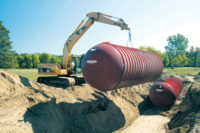Green Roof Solves Stormwater Runoff Problem
Since 1913, Rice Fruit Company in Gardners, Pa., has distributed fresh fruit throughout the United States. As the largest apple-packing facility in the eastern half of the United States, Rice has developed a reputation based on quality and high standards.

Since 1913, Rice Fruit Company in Gardners, Pa., has distributed fresh fruit throughout the United States. As the largest apple-packing facility in the eastern half of the United States, Rice has developed a reputation based on quality and high standards.
Rice Fruit Company, a family-owned business operation, is currently operated by four brothers who represent the third generation to run the business. Rice Fruit Company is surrounded by thousands of acres of fruit-producing orchards. Owning more than 800 acres of orchards in the region, the Rice family produces approximately one-fifth of the fruit that the company packages and delivers to customers across the country.
Since its inception, Rice Fruit Company has seen continual growth in its business. Recently, Rice decided to construct a new cold-storage facility to provide additional space for daily operations. The Rice family focused on making the building as environmentally friendly and as non-invasive as possible and chose to use a roof garden system for the new building. Allowing the structure to maintain a natural appearance and blend into the surrounding area, a vegetative roof was the perfect choice for this project.
While the natural appearance of the roof was important, Rice saw another valuable benefit of the roof garden system. Pennsylvania building codes call for the installation of a retaining pond with most commercial buildings so rainwater and stormwater runoff can be managed without flooding. With the installation of the new cold-storage facility at Rice, the space was not available to install a retaining pond. Looking for alternatives, David Rice, president of Rice Fruit Company, came across the idea of installing a Roof Garden System manufactured by Carlisle SynTec. Utilizing hundreds of square feet of typically wasted roofing space, the company was able to replace the retaining pond with a roof garden that could manage and control water flow.
 Roof System Installation
Roof System Installation
The 22,000-square-foot facility was designed to provide an energy-efficient yet effective cold-storage location. With construction beginning in August, the timetable for this project was very brief as Rice hoped to complete the building in less than three months in order to store the apple harvest of the fall. An efficient construction process was necessary.
Rice Fruit Company partnered with Conewago Enterprise to manage the general construction of the facility and with Donald B. Smith Roofing Inc., a family-owned roof-contracting firm based out of Hanover, Pa., to manage the installation of the roof system. With the environmental elements and time constraints to consider, Doug Smith, president of Donald B. Smith Roofing, chose to install a 0.080-inch thick reinforced Sure-Weld TPO fully adhered roofing system manufactured by Carlisle SynTec. After securing the membrane in place and providing a protective weather barrier, the workers could install the growth media and plants on the roof.
To begin the construction of the Rice Fruit facility, Conewago Enterprise installed the foundation, concrete walls and a concrete roof deck. After the frame and shell of the building were intact, Donald B. Smith Roofing began to install the green roof system. The roofing crew first installed a layer of 4-inch polyisocyanurate insulation on top of the concrete deck to provide a protective barrier that would control airflow. After this layer was applied, the roofers installed an additional layer of 3-inch polyiso.
The two layers of insulation were installed using Carlisle’s FAST 100 adhesive, a two-component, construction-grade adhesive that allows for a strong bond and superior wind uplift protection.
The workers from Donald B. Smith Roofing were careful to install the layers in a staggered pattern, avoiding overlap of seams, to provide superior protection from air penetration and prevent thermal bridging.
Once the insulation was secure and in place, the two layers were covered by 1/2-inch DensDeck Prime coverboard. After the insulation and DensDeck were fastened in place, the 100-foot-long by 10-foot-wide Sure-Weld membrane was adhered directly to the insulation system with Carlisle’s Sure-Weld Bonding Adhesive.
Once the membrane was adhered to the roof surface, the system was allowed to perform against the elements. After withstanding a brief period exposed to the elements and passing extensive tests performed by Donald B. Smith Roofing, the roof system was ready for the addition of the green material.
The Living Roof
The first step to installing the green roof system was to lay down the Carlisle protection fabric to the existing system. Manufactured as a non-biodegradable needle-punched fabric, the protection mat is able to resist mildew and insects as well as invasive soil chemicals. On top of the protection mat, the roofers installed Carlisle’s MiraDRAIN panels. These panels are designed to retain enough water to nourish the plants on the roof while allowing all excess water to flow to the drainage system. To finish the roofing system, 3 inches of soil media from Skyland USA was placed on top of the system. Once the growth media was in place, 12 different varieties of plants from Emory Knoll Farms in Maryland were installed to complete the system.
“The roofing system proved to be one of the best options for Rice Fruit Company,” Smith said. “The 80-mil membrane creates a beautiful, wrinkle-free roof system. With the addition of the plant material, the system not only offers protection from leaks but can easily handle and control stormwater runoff.”
“The roof garden on our facility has performed beyond our expectations,” said Rice. “The roofing system eliminates stormwater runoff and also provides the protective barrier that we need on our cold-storage facilities.”
Because this is one of the first green roof systems in south central Pennsylvania, many individuals have contacted both Rice and Donald B. Smith Roofing regarding the possibility of installing a similar system.
“Visitors have come to our new facility to examine the roof garden system,” said Rice. “Many individuals have a difficult time comprehending the fact that there is plant material growing on our roof. However, seeing the benefits of a system like this, I believe many others will be going this route in the future.”

The Rice Fruit Company in Gardners, Pa., installed a vegetative roof on its new 22,000-square-foot cold-storage facility.
Since 1913, Rice Fruit Company in Gardners, Pa., has distributed fresh fruit throughout the United States. As the largest apple-packing facility in the eastern half of the United States, Rice has developed a reputation based on quality and high standards.
Rice Fruit Company, a family-owned business operation, is currently operated by four brothers who represent the third generation to run the business. Rice Fruit Company is surrounded by thousands of acres of fruit-producing orchards. Owning more than 800 acres of orchards in the region, the Rice family produces approximately one-fifth of the fruit that the company packages and delivers to customers across the country.
Since its inception, Rice Fruit Company has seen continual growth in its business. Recently, Rice decided to construct a new cold-storage facility to provide additional space for daily operations. The Rice family focused on making the building as environmentally friendly and as non-invasive as possible and chose to use a roof garden system for the new building. Allowing the structure to maintain a natural appearance and blend into the surrounding area, a vegetative roof was the perfect choice for this project.
While the natural appearance of the roof was important, Rice saw another valuable benefit of the roof garden system. Pennsylvania building codes call for the installation of a retaining pond with most commercial buildings so rainwater and stormwater runoff can be managed without flooding. With the installation of the new cold-storage facility at Rice, the space was not available to install a retaining pond. Looking for alternatives, David Rice, president of Rice Fruit Company, came across the idea of installing a Roof Garden System manufactured by Carlisle SynTec. Utilizing hundreds of square feet of typically wasted roofing space, the company was able to replace the retaining pond with a roof garden that could manage and control water flow.

The 80-mil reinforced Sure-Weld TPO fully adhered roofing system used on the project was manufactured by Carlisle SynTec.
The 22,000-square-foot facility was designed to provide an energy-efficient yet effective cold-storage location. With construction beginning in August, the timetable for this project was very brief as Rice hoped to complete the building in less than three months in order to store the apple harvest of the fall. An efficient construction process was necessary.
Rice Fruit Company partnered with Conewago Enterprise to manage the general construction of the facility and with Donald B. Smith Roofing Inc., a family-owned roof-contracting firm based out of Hanover, Pa., to manage the installation of the roof system. With the environmental elements and time constraints to consider, Doug Smith, president of Donald B. Smith Roofing, chose to install a 0.080-inch thick reinforced Sure-Weld TPO fully adhered roofing system manufactured by Carlisle SynTec. After securing the membrane in place and providing a protective weather barrier, the workers could install the growth media and plants on the roof.
To begin the construction of the Rice Fruit facility, Conewago Enterprise installed the foundation, concrete walls and a concrete roof deck. After the frame and shell of the building were intact, Donald B. Smith Roofing began to install the green roof system. The roofing crew first installed a layer of 4-inch polyisocyanurate insulation on top of the concrete deck to provide a protective barrier that would control airflow. After this layer was applied, the roofers installed an additional layer of 3-inch polyiso.
The two layers of insulation were installed using Carlisle’s FAST 100 adhesive, a two-component, construction-grade adhesive that allows for a strong bond and superior wind uplift protection.
The workers from Donald B. Smith Roofing were careful to install the layers in a staggered pattern, avoiding overlap of seams, to provide superior protection from air penetration and prevent thermal bridging.
Once the insulation was secure and in place, the two layers were covered by 1/2-inch DensDeck Prime coverboard. After the insulation and DensDeck were fastened in place, the 100-foot-long by 10-foot-wide Sure-Weld membrane was adhered directly to the insulation system with Carlisle’s Sure-Weld Bonding Adhesive.
Once the membrane was adhered to the roof surface, the system was allowed to perform against the elements. After withstanding a brief period exposed to the elements and passing extensive tests performed by Donald B. Smith Roofing, the roof system was ready for the addition of the green material.
The Living Roof
The first step to installing the green roof system was to lay down the Carlisle protection fabric to the existing system. Manufactured as a non-biodegradable needle-punched fabric, the protection mat is able to resist mildew and insects as well as invasive soil chemicals. On top of the protection mat, the roofers installed Carlisle’s MiraDRAIN panels. These panels are designed to retain enough water to nourish the plants on the roof while allowing all excess water to flow to the drainage system. To finish the roofing system, 3 inches of soil media from Skyland USA was placed on top of the system. Once the growth media was in place, 12 different varieties of plants from Emory Knoll Farms in Maryland were installed to complete the system.
“The roofing system proved to be one of the best options for Rice Fruit Company,” Smith said. “The 80-mil membrane creates a beautiful, wrinkle-free roof system. With the addition of the plant material, the system not only offers protection from leaks but can easily handle and control stormwater runoff.”
“The roof garden on our facility has performed beyond our expectations,” said Rice. “The roofing system eliminates stormwater runoff and also provides the protective barrier that we need on our cold-storage facilities.”
Because this is one of the first green roof systems in south central Pennsylvania, many individuals have contacted both Rice and Donald B. Smith Roofing regarding the possibility of installing a similar system.
“Visitors have come to our new facility to examine the roof garden system,” said Rice. “Many individuals have a difficult time comprehending the fact that there is plant material growing on our roof. However, seeing the benefits of a system like this, I believe many others will be going this route in the future.”
Looking for a reprint of this article?
From high-res PDFs to custom plaques, order your copy today!






